Once you’ve been learning to play for a little while, you might feel that you’ve started to outgrow your first trumpet, especially if you started off on a cheap beginner instrument. But knowing which one to go for that is going to improve your playing can be difficult.
To help, in this article we review 6 of the best intermediate trumpets as well as provide a buyer’s guide of all the different features that differentiate them from beginner and professional models so you know what to look for when buying.
Quick Answer: The Best Trumpet for Intermediate Players










Best Rated Intermediate Trumpet Reviews
Now that you hopefully have a better idea of what you’re looking for when buying an intermediate trumpet it’s time to look at reviews of our favorite models available today.
1. Jupiter 1100S Intermediate Bb Trumpet
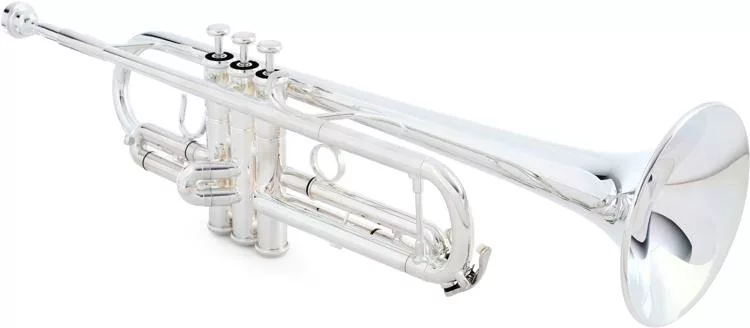
Our first recommendation for intermediate trumpets is the Jupiter 1100S Bb Trumpet which is an excellent option for an intermediate trumpet player looking to improve. It is easy to play, has great sound and intonation, and comes with features typically found on advanced trumpets.
This Bb trumpet has a silver-plated yellow brass body, a 4.8-inch bell, and a .460-inch bore, enhancing each and every sound. This model also features an adjustable 3rd valve ring slide, which makes it comfortable to play for long rehearsal sessions, ensuring that you’ll get the most bang for your buck.
The instrument’s top feature is its lead pipe. The lead pipe is rose brass, which warms your instrument’s sound and makes every note richer. Additionally, the lead pipe is a reverse lead pipe, which allows for more free-blowing once you’re ready to add your own expression to your sound.
This is a durable trumpet that sounds great, is built for comfort, and transitions easily from the intermediate level to a more advanced trumpet player.
2. Yamaha YTR-4335GII Intermediate Bb Trumpet

Next, we have the Yamaha YTR-4335GII Intermediate Bb Trumpet which is a beautiful gold brass trumpet that is durable, yet not without fantastic sound quality. Yamaha is a leader in the musical instrument industry and is known for high-quality instruments suited to beginner, intermediate, and advanced players alike.
The trumpet features a 4.84-inch gold brass bell and a 0.459-inch bore. The 2nd and main tuning slides have the same detailed production that Yamaha employs for their advanced trumpets, guaranteeing quality and stability. This model is known for its wide range of tonal colors due to its tuning slides and gold brass bell and will elevate your sound.
While on the more expensive end of intermediate trumpets, this trumpet is definitely worth the investment if you’re serious about taking your trumpet playing to the next level and achieving high-quality sounds. This is a great option for someone hoping to continue to pursue trumpet and who wants something that will last.
3. Yamaha YTR-2330 Standard Bb Trumpet
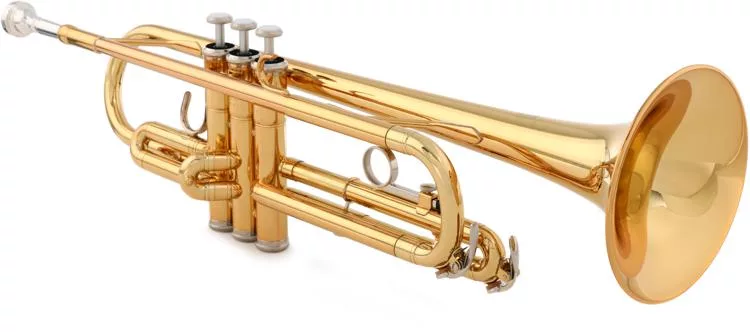
Another option from Yamaha, the YTR-2330 Standard Bb Trumpet is definitely cheaper, but still boasts a good quality for advanced beginner students. This is Yamaha’s most prevalent student trumpet and is a winner for its easy playability, consistent tone, and inexpensive price tag.
The trumpet has a 4.84-inch yellow brass bell and a 0.459-inch bore. The bell is durable and light.
The yellow brass material makes the horn consistent in its sound and playability, which is perfect for students who are still learning and constantly practicing new techniques. The trumpet’s pistons are also highly durable to maximize the trumpet’s lifespan and give you the most bang for your buck.
Although this trumpet is only half as expensive as other intermediate trumpets, it is still a high-quality and durable model that doesn’t compromise on its sound. This is a fantastic trumpet, albeit without the bells and whistles and is definitely worth it for someone on a budget.
4. Bach TR300H2 American Intermediate Trumpet
- The 300 Series trumpet was designed to help the student find it easier to concentrate on making music rather than struggling with the instrument.
- It also features Monel metal piston valves, precision made, with a one-point nylon valve guide for noiseless operation Bracing reinforces
- A durable double-wall case, which cushions and protects the trumpet, featuring ample storage space for accessories, comes with a shoulder strap
The Bach TR300H2 American Student Trumpet was designed for ease of playability with trumpet students in mind. Why waste valuable practice time struggling with your instrument when there is technique and music to learn? This trumpet helps you to avoid the hassle.
This trumpet has a 4.84-inch yellow brass bell and a 0.459-inch bore, ensuring that the trumpet has easy projection and control. The instrument features a 1st valve thumb saddle, which makes intonation adjustments a breeze, and the red brass lead pipe adds a warmness to the trumpet’s sound. The instrument is a yellow brass color, finished with a clear lacquer.
This is a great trumpet that was truly designed for students, helping intermediate trumpet players focus on their technique and skills rather than the instrument’s trickiness. It also comes with a double-wall case to keep the trumpet protected, helping it to last for years to come.
5. Conn 52BSP CONNstellation Series Intermediate Bb Trumpet
- Key of Bb, Monel Valves
- 462" Large bore
- 4.9" Seamless bell
The Conn 52BSP CONNstellation Series Bb Trumpet is a larger intermediate trumpet, which can be either a benefit or a drawback depending on your size, strength, or what you are looking for. It is weightier than the other options and has larger features, as well.
This trumpet has a 4.9-inch brass bell and a .462 inch bore, which are slightly larger features than the rest of the trumpets listed. It features a reverse lead pipe, which allows for a freer, more expressive sound from intermediate players ready to get inventive with their sound. It also features a 1st valve thumb saddle, making intonation adjustments easier. It has a silver plate finish that provides brilliance to the overall sound.
This trumpet is a good option for someone with larger hands and a bit more experience. If you are a newer student, this may not be the option for you. But for someone with practice, the Conn 52BSP CONNstellation Series Bb Trumpet is a great option worth considering.
6. Jean Paul USA TR-430 Intermediate Trumpet
- The Jean Paul Trumpet is in key of Bb
- Rose brass lead pipe
- Adjustable third trigger allowing for a natural hand position and proper playing technique
And finally, we have the Jean Paul USA TR-430 Intermediate Trumpet which is another low-budget option for intermediate trumpet players. It is much cheaper than the rest of the options listed but is still of solid quality for someone just getting into trumpet playing.
The trumpet features a 4.92-inch bell and a 0.459-inch bore. It is made of yellow brass, finished with gold lacquer. It has a rose brass lead pipe which lends a warmness to the trumpet’s sound and has an adjustable third trigger that offers maximum hand comfort, allowing for longer practice sessions. This trumpet was also designed with students in mind and is a great budget option for new learners.
This trumpet is easily the least expensive option for an intermediate trumpet. It’s also great for a beginner. However, if you’re looking to hone your skills and work up to advanced or professional trumpet playing, it may be worth investing a bit more money on another option. A slightly more expensive trumpet can offer more advanced features.
How to Choose and Intermediate Trumpet: A Buying Guide
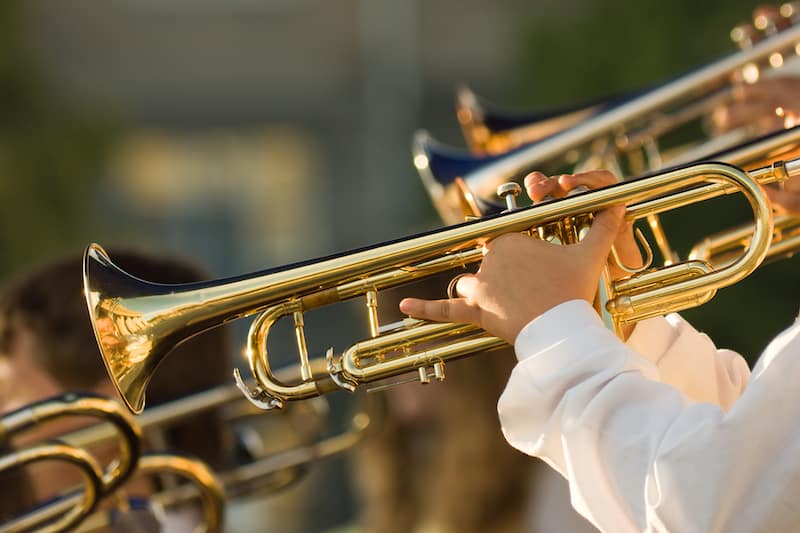
Now that we’ve looked at our intermediate trumpet reviews, we’re next going to look at some of the common questions that students ask when looking to upgrade to an intermediate trumpet from their first one.
There’s a bit of a jump in terms of price from beginner models so you want to ensure that you’re getting the right one and not wasting your money.
Let’s jump in with what’s the difference between intermediate trumpets and beginner or pro ones.
Beginner vs Intermediate vs Professional Trumpets
While there is a whole spectrum of price ranges to fit every budget, most instrument manufacturers have three levels in mind when they produce and market their instrument: beginner, intermediate, and professional.
First, let’s take a look at the beginner and professional levels, and some of the features you can expect within each.
Then we’ll focus on the intermediate models in more depth.
Beginner Trumpets
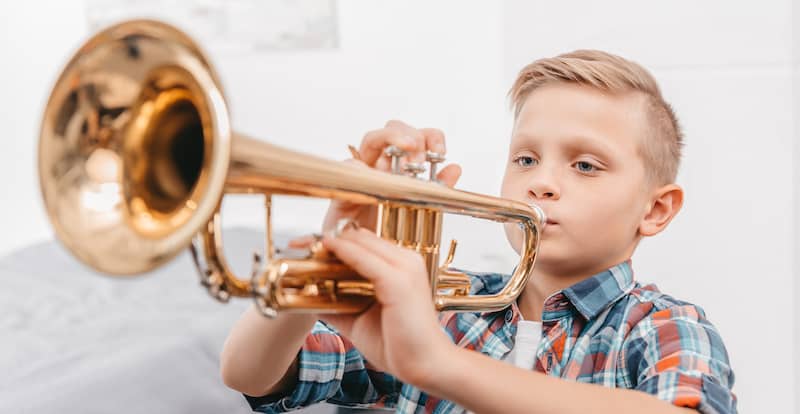
Beginner trumpets are designed above all to be affordable and easy to play.
Some of their technical specifications will be geared towards playability, such as a medium rather than large bore size, a small mouthpiece that is easier to produce notes on, and an adjustable finger ring on the third valve to fit different size hands.
However, the use of cheaper materials and manufacturing processes means that these instruments may not be particularly durable.
The lacquer or silver plating may corrode quickly, and the sound of the instrument might not be particularly rich or full.
You may find that the valves on beginner instruments are liable to stick frequently and require a lot of valve oil, and they might not move particularly quickly and quietly even when oiled.
This can prove problematic as you move onto faster and more difficult music!
Finally, the intonation (tuning) of beginner trumpets may not be as accurate as more expensive instruments.
Again, this is because they are designed to be inexpensive and easy to play, rather than focusing on quality and fine-tuning.
As is so often the case, you pretty much get what you pay for! So beginner instruments are likely to be cheaper, in the range of $100-$300.
But that budget comes at the expense of build quality and sound.
That’s not particularly a problem when you’re first starting out, but as you begin to make a better sound and play more difficult pieces, you might find yourself starting to feel limited by the tone and the quality of your instrument.
Professional Trumpets
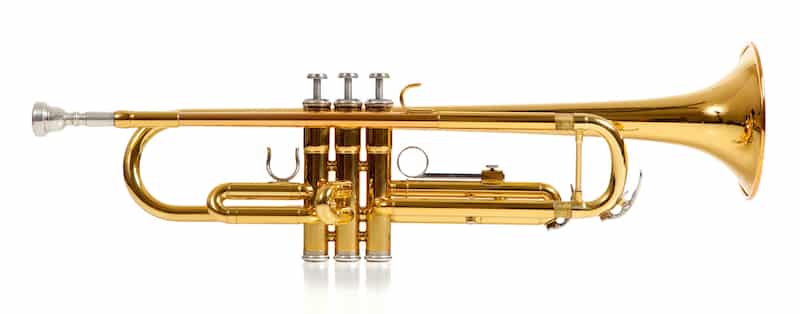
At the other end of the scale, professional instruments are designed to be of the highest build quality and technical specifications.
But this also means that they are much, much more expensive! What do you get for the extra money?
Well, a lot of the improvements are likely to be intangibles that don’t show up on paper.
The quality of the materials and manufacturing should be better on professional instruments.
That means that the brass is made to high specifications, meaning it has a uniform consistency and is less liable to corrosion.
The lacquer or silver plating will also be of better quality, meaning that it corrodes less, and will therefore protect the brass underneath for much longer.
In addition, the manufacture and design of each part of the instrument, and the way they are assembled, is carried out carefully to better technical specifications, all with the utmost quality of sound and playability in mind.
All of these details add up to a fuller, richer sound, quicker, lighter valves, and more accurate intonation and feel throughout the instrument’s range.
These are all difficult to measure or compare from the technical specifications on a website, which after all are mainly the measurements of certain limited features (e.g. bore size, bell size).
These matter, but the only way you can really feel the difference is to play a beginner and a professional instrument side by side.
There are a few other additions which do distinguish professional instruments, however.
They may have more features to adjust intonation on the first and third valve slides, such as finger and thumb rings or triggers, and a screw on the third valve slide to enable accurate adjustments or to stop the slide from falling off.
Professional instruments are likely to feature a greater range of bore sizes and bell sizes to account for different playing styles and specializations.
For example, they may be geared towards a brighter sound for jazz or commercial trumpet players, or a fuller, darker sound for orchestral musicians.
However, these additional features are more a matter of personal preference than being objectively ‘better’ than each other.
It is the quality of build, sound, and intonation that really makes the difference in a professional instrument.
All of that can add up to a pretty hefty price tag, with the most expensive trumpets costing in the region of $10,000.
Intermediate Trumpets
Now that we’ve looked at the extreme ends of the spectrum, let’s finally get to intermediate trumpets! As the term suggests, they fit neatly half-way between beginner and professional instruments.
They’re designed to give you better quality of sound and playability than beginner instruments, but without the much bigger budget of professional instruments.
In practice, this means that the technical specifications might not be all that different from beginner instruments.
The difference comes in the better materials and fine-tuning of the design, which leads to better sound, intonation, and ease of playing.
Whereas professional instruments are designed with the highest standards in mind, there is more of a balance between quality and budget in intermediate instruments.
This means that, while they should be better made than beginner trumpets, they may still be manufactured from slightly cheaper material or made in factories will a lower build quality than more expensive professional instruments.
However, you will still find many of the features that you can expect from more expensive instruments: a stronger sound, more accurate intonation, valves that move more quickly and easily, thumb and finger rings on the first and third valve slides.
All of this means that these instruments are well-designed for intermediate players, who might be tackling more advanced music, but are still not developed enough in their sound and technical expertise to fully take advantage of a more expensive instrument.
When to Switch to an Intermediate Trumpet
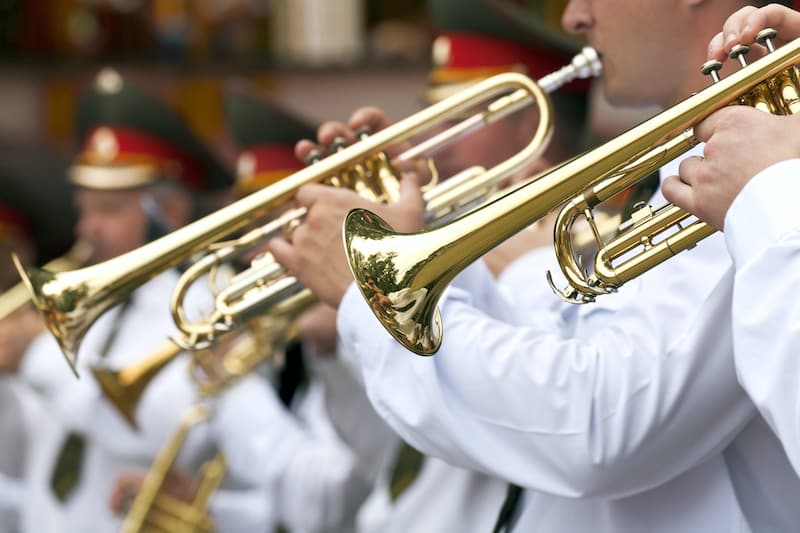
Now that we’ve looked at the different features of each level of trumpet, you might be wondering which one is going to be best for you.
The most obvious answer – but probably not the most helpful – is that if you’re a beginner, you only really need a beginner trumpet; if you’re a professional, you’ll want a professional instrument; and if you’re somewhere in between, an intermediate trumpet is best suited to you.
So let’s unpack that a little.
When we’re talking about intermediate players, we mean that you’ve probably advanced beyond your first method book, but you’re not yet playing Sonatas and Concertos that make up professional concert repertoire.
Your range of notes is likely to be down to low F# below the staff, and up to A above the staff, or possibly up to C.
You might be playing exercises from some of the classic methods like J.B. Arban’s Cornet Method or Herbert Clarke’s Technical Studies, or getting to grips with major and minor scales and arpeggios in a few different keys.
In terms of your playing, you might be starting to really concentrate on improving your sound in slower pieces, or working on moving your fingers quicker in order to play faster notes with more ease.
You may be moving the first or third valve slides to adjust the tuning of certain notes.
If you’re playing a beginner trumpet, you might also have become aware of some of the limitations of your instrument at this stage.
Maybe you don’t like the sound you’re producing, or you struggle to move the valves quick enough to play faster passages.
This is a good point to think about upgrading your trumpet.
While you might covet a top instrument like a Bach Stradivarius or a Yamaha Xeno, they might be a bit outside your budget.
So an intermediate trumpet might be a pretty good buy at this point in your musical journey.
Best Brands of Intermediate Trumpets
There’s a bewildering array of trumpets available at every budget point, with differing makes, models, and technical specifications.
The best way to compare instruments will always be to try them out yourself! If you can get to a music shop, you can try different trumpets out one or the other, even if you later then buy online.
Otherwise, you may be able to buy online and return an instrument if it’s not quite what you’re after.
Most of the major professional trumpet manufacturers also produce a range of intermediate instruments.
While they might not be made in the same factories or to the same design as the top models, nevertheless they offer good quality and sound for intermediate players.
Top brands like Yamaha, Vincent Bach, Conn-Selmer, Getzen, Besson and Schagerl all produce intermediate models.
If you’re on a budget, you can still find good instruments second-hand for a much lower price than new – you might even be able to pick up a professional model for a bargain, so it’s always worth considering.
But if you do go second-hand, it’s even more important to be able to try before you buy.
So, Which One Should You Buy?
That wraps up our guide to buying an intermediate trumpet. We hope it helps make sense of what you need to be looking for.
If you’re still on the fence about which one to go for we’d recommend the Jupiter 1100S Intermediate Bb Trumpet.
It is an easy-to-play option that doesn’t compromise sound or quality for comfortability, making it perfect for the intermediate trumpet player who is looking to become more advanced and skilled in their trumpet playing.
If you are a student on a tighter budget, then the Yamaha YTR-2330 Bb Trumpet might be a better way to go for your best budget value.
It is priced at about half the cost of other intermediate trumpets but was designed with students in mind and is built for durability and longevity.
Even at its low price point, you can take this trumpet from the intermediate level to the advanced level, and it will last for years.
- Jupiter JTR1100S Intermediate Model Trumpet
- Key of Bb -- Bright Silver Finish (Silver-Plated Yellow Brass) -- Stainless Steel Pistons
- Reverse Leadpipe -- .460" Bore -- Custom B1 Bead 4.8" Bell -- Medium Weight


